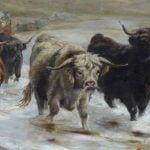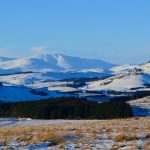Humans have always used stories to make sense of the world. Since pre-history, we’ve told them in many different ways; through rock art, rhymes, songs, myths, legends, fables and epic poems.
Even religion, prayers, proverbs, and certain kinds of instruction use storytelling to communicate and connect. We’ve told stories orally, in writing, in images and today through digital means such as television and movies and immersive and interactive mediums such as gaming.
People are drawn to stories because they play a powerful role in transmitting personal and collective experiences. In addition to sharing information in a memorable way, they can move us emotionally, enabling us to empathise with others, both human and more than human, help us relate to the landscapes we call home and open up our imagination to new possibilities.
As well as inspiring us, stories can explain the world, help us understand very difficult things, offer deep truths, answer timeless questions and pass on important values from one generation to another.
 Storyteller, Lindsey Gibb, photo Clare Cooper
Storyteller, Lindsey Gibb, photo Clare Cooper
And they can help us to imagine how things can be different.
Today, people are recognising that in order to tackle the huge polycrisis we face – global heating, biodiversity collapse and a broken economic model – we need to imagine how things can be different.
Tapping back in to our stories can help us do that and Scotland’s ancestral library is an abundant resource.
In the Scottish Gaelic folklore tradition, the divine hag, the Cailleach, is the creator and shaper of the land, the maker of mountains and the harbinger of winter. As we approach Samhain, the Gaelic festival celebrated at the end of October, which marks the end of the harvest season and the beginning of winter, her storm energies gather force. But she is also known as a guardian of the natural world, the protector of wolves, deer and other creatures and is often depicted with one eye, a trait characteristic of deities who can see beyond this world and into the next.
 Ben Gulabin in winter, photo Clare Cooper
Ben Gulabin in winter, photo Clare Cooper
Can her mix of creator/destroyer/futurist teach us something about how to live in these apocalyptic times? Could tapping into her energy help us reframe the intensity of nature’s energy that we are experiencing into a source of shared connection and empowerment? Could ‘Becoming Cailleach’ help build our individual and collective resilience?
We commissioned our Makar, Jim Mackintosh to take this idea and build on it through his poetry.
 The Alyth Burn flooding in October 2021, photo Steve Taylor
The Alyth Burn flooding in October 2021, photo Steve Taylor
Drawing from our current programme which is focusing on how humans in this part of Scotland have changed and managed our landscapes and environments in the past and how as inhabitants and visitors, our survival depends on taking better care of them in the future, he is writing a series of four long poems, which will take us on a journey that shows us how the Cailleach symbolises not only nature’s raw power, but the strength and endurance of people, and reminds us that within every winter lies the promise of spring.
Today we publish the first part of this journey – ‘Firstlings’, which you can watch and read below.
BECOMING CAILLEACH
by Jim Mackintosh
Firstlings
I
Water song. Raised from wise mountains way beyond:
across slouch and skim, firstlings of tone, reed notes
strung in the beech rooted nook, the voice of herself
like an encouraging hand placed on your shoulder
or the restless turn of long travelled pebbles
yet to find settled peace below the river’s alter.
Was music once the proof she was our mother?
I’ll take that as my prayer to pull around myself,
the assured blanket of her wise woven existence.
So let the ear decide like the shepherd at the fank gate
in mizzled light, counting the herds of doubters
stumble uncertain into their lyrical future. She will wait.
II
‘Remember this. As your false dawns of progress falter,
my voice will never be silenced. My words remain as earth
and air. My stratified tongue the outcrop of your examinations.’
Naïve minds claw at the weave but their futile sweat-shards
drop into the dark recesses of previous failures to tame
the wild constants of all that is not theirs to shackle.
What is it you try to achieve? You are forever in the fidget
of transient glory, grafting endlessly at your next vanity of
self-indulgence. Only for it to crumble into another layer
of dust then swept up by the cailleach’s mocking laughter
echoing in high corries, under stone arches, on water-song
to drift away – sea bound, inevitably emptied of its soul.
III
And lock her words into your mouth, in actions too
so when the terraforms of greedy inquisition simmer:
become cailleach, hold wise, earth-hearted – shine light
where forefathers bent to the landlord’s silver, not
for profit or the progress of noble deliberations, yet
only to shelter the bairns and fill their bellies with love.
The shovel, the pick axe held out towards the lens
in mud-lock stance where the line-up of honest graft
under the weight of weary eyes prays for better days
and by candle light owns the pain of grace by labour.
We walk the paths they built, the land they shaped.
We stand in doorways with them unseen yet still there.
IV
Memories embedded in the mulch of our surroundings,
fluid in their seep, the unravel of sinew and blood, coin
and crown, weft and plough – statues in tackety boots or
white linen aprons stained with ancestral sweat and tears.
With our fixed perceptions waiting to be unstitched, to
learn to read again, to understand the codes of our lands
so that our mind’s eye can teach itself to focus our bairns
futures into sharper visions where our history folds familiar
through our learnings into tomorrow. The time is now.
Let the bairns find nourishment in the anchoring of words.
Only in knowledge of what has been lived through,
can the influence of common wealth
be shared equally and the wisdom of our earth be cherished.

